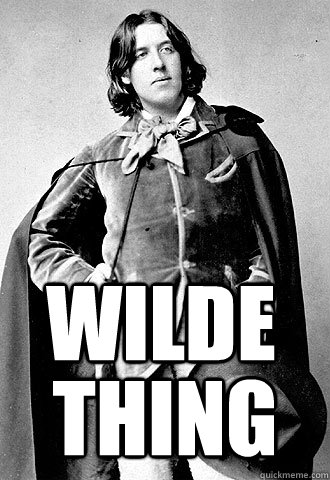
|
| MAIN THEME OF PLAY: CUCUMBER SANDWICHES |

In Oscar Wilde’s comical play, The Importance of Being Earnest, the
main characters undergo a physical journey from the city to the country that contributes
to the critical assessment of the Victorian time period and those who partake
in the society’s trivial and pompous customs. Wilde questions the validity of
the morals and manners of the Victorian era, as well as the theme of trivial details
being more significant than the emotional ups and downs that reality brings. The
physical journey of the main characters illuminate the act of hypocrisy that
accompanies the petty manners that are required to be accepted in the society.
Jack Worthing’s journey from his city
life of being Ernest to his home in the country where he is simply referred to
as “Uncle Jack” connects to the title of the play because for Jack it is
extremely essential that he becomes Ernest. Being Ernest means that he will be
able to marry his love, Gwendolen Fairfax, a pompous and oblivious woman who
believes that it is her destiny to marry an “Ernest” and that the name Ernest “produces
vibrations”. Something as insignificant as a name can make or break this
engagement which contributes to the criticism of the Victorian society because such
a trivial detail is more important than the emotional connection and love they
share. A majority of the conversations taking place amongst the characters are about
irrelevant and shallow topics such as: who ate Aunt Augusta’s favorite cucumber
sandwiches.
Jack continues the journey to the
country by completing it by saying that his brother Ernest has passed away and
he pretends to be mourning the death of his imaginary alter ego while Algernon
Moncrieff randomly appears and claims to be Jack’s brother Ernest. Algernon is
on a quest to woo Jack’s ward, Cecily Cardew, who is very anxious and
determined to meet Ernest. The theme of separating reality from fiction is a major
problem for Cecily. She has convinced herself that she has met Ernest
(Algernon) before and claims that he has done things when in reality he did
not. By incorporating the idea of separating reality from fiction Wilde enhances
the ridiculous and pompous attitudes occurring in the play and the time period.
At this point in the play, both Cecily
and Gwendolen believe that they are engaged to Ernest. When the two eventually
realize that they have been deceived they immediately become the best of
friends which contributes to the theme of hypocrisy because a few moments
before they were insulting one another, with proper manners, of course. This
scene is significant to Wilde’s critical view of the society because the two
girls are fighting with one another but neither one of them is allowed to lose
composure because it would be “improper” and “immoral”; so instead of using foul language
and human emotions to express their anger they use petty retaliations such as
putting sugar in the tea and serving cake although bread was requested. After the
two girls had finished their childish argument, they confronted the men and
discovered that they were being deceived the entire time and neither one of
them is engaged to Ernest, so naturally, they are able to be friends. This
scene is hypocritical because the two girls were just insulting one another,
and now they are on the same team because they have been deceived.
The final act of disregarding significant
topics occurs in the last scene where Jack discovers that he is related to
Algernon. Jack reveals the handbag expecting to have an emotional and tender
moment of awakening and Miss Prism is in disbelief because she is relieved to
have the handbag back because it was a “great inconvenience.” Instead of having
raw, human emotions that would be expected at a time like this the reaction is
heartless and trivial. Wilde uses this trivial and pompous attitude to
criticize the morals of the Victorian society; they claim to have manners and
morals, however, when it comes to the important human emotions and topics such
as: death, marriage, and realizing you have a long lost family, the society
ignores it and continues to discuss silly and insignificant items, like a hand
bag and cucumber sandwiches.
The journey from the city to the country
side revealed the immature behavior of the characters. Jack’s journey is ironic
because he starts off claiming to Gwendolen his name is Ernest and then when he
is in the country he “kills off” his brother Ernest, and in the end he is
really Ernest after all. The play criticizes the importance of being earnest,
because none of the characters were able to talk about honest and serious
topics. They were only able to focus on the status, morals, and manners that
the Victorian society claimed acceptable.